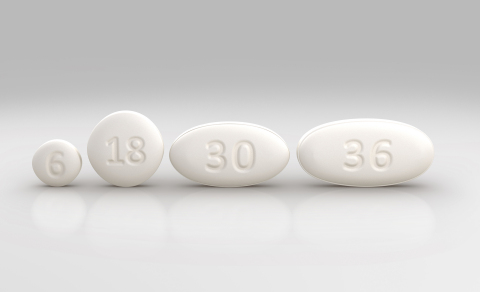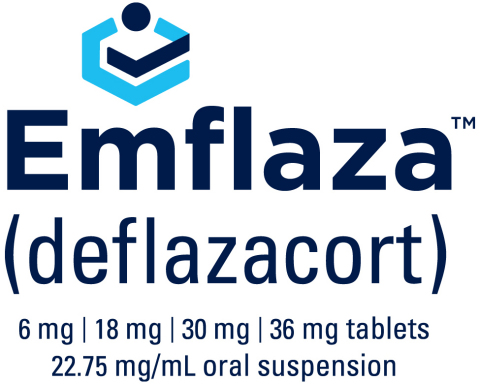NORTHBROOK, Ill.--(BUSINESS WIRE)--Marathon Pharmaceuticals, LLC (Marathon), a U.S. research-based biopharmaceutical company focused solely on the development of new treatments for rare diseases, today announced that the U.S. Food and Drug Administration (FDA) has granted approval of EMFLAZA™ (deflazacort) for the treatment of Duchenne muscular dystrophy in patients 5 years and older. Duchenne, a severe form of muscular dystrophy, is a rare disease and fatal genetic disorder that affects about 15,000 people in the United States.1
“We are in a new era in the treatment of Duchenne muscular dystrophy. For the first time, patients in the U.S. with Duchenne will have widespread access to an FDA approved medicine that is indicated for all genetic forms of the condition. We are pleased that this development will help patients with this disease stay stronger longer,” said Timothy M. Cunniff, Pharm.D., Executive Vice President, Research & Development, Marathon Pharmaceuticals. “This is only the first of our products to treat Duchenne muscular dystrophy and we are committed to serving this community of patients, researchers and advocates until a cure is found.”
The FDA granted EMFLAZA priority review, which is reserved for investigational medicines that may offer major advances in treatment over existing options. EMFLAZA is a new chemical entity in the United States that has never before been approved for the treatment of Duchenne muscular dystrophy anywhere in the world.
“We are pleased to learn that the FDA has approved EMFLAZA,” said Pat Furlong, founding President and CEO of Parent Project Muscular Dystrophy (PPMD), the largest nonprofit organization in the United States focused solely on Duchenne muscular dystrophy. “While steroids are considered Standard of Care for Duchenne patients, there has been no steroid specifically approved for Duchenne. The FDA approval of EMFLAZA provides options for our families when making crucial decisions about care with their providers. We hope that this approval gives more families access to this important medication."
Marathon Pharmaceuticals conducted 17 new preclinical and clinical studies and exclusively licensed two additional clinical studies to support the New Drug Application submissions to the FDA. This investment in research and development has led to new understanding of the dosing, drug interaction and safe use of EMFLAZA in the Duchenne patient population. Additional post-market research will continue to advance the science of the drug and the care of patients with Duchenne. One planned study will examine various dosage regimens in younger patients with Duchenne to determine if earlier intervention is safe and effective and ultimately impacts the course of the disease. A second planned study will examine various dosage regimens in non-ambulatory patients with Duchenne and characterize the pulmonary and cardiac effects of EMFLAZA.
“EMFLAZA is an important new drug with proven benefit in boys with Duchenne muscular dystrophy, increasing muscle strength and physical function, which is important for both patients and caregivers. In my own research and in the clinic deflazacort keeps boys walking longer. By undertaking the research needed to secure FDA approval of EMFLAZA, we now know more about the drug, its dosing and possible interactions. These are all advances in care for patients with Duchenne,” said Robert C. Griggs, M.D., University of Rochester Medical Center, a leading neurologist and an early investigator of deflazacort.
“My son James is living with Duchenne, and this important treatment option has had a positive effect on him. Today’s approval makes it possible for all patients living with Duchenne to get access to this new treatment option. That’s an important step forward. Marathon’s commitment to research – conducting the research needed for FDA approval and its ongoing clinical programs – means continued progress in the treatment of Duchenne,” said Joel Wood, father of a son with Duchenne and President of the Foundation to Eradicate Duchenne.
Commitment to Access
Marathon is committed to working closely with payers to meet the patient and payer needs for acceptable access to EMFLAZA. Additionally, Marathon has invested in EMFLAZA being accessible to all families and physicians who wish to use it without undue burden on families or the healthcare system.
“We have developed models to ensure EMFLAZA is of great value to payers, and does not create a burden of any sort to the healthcare system. This is important to us, as an American research and development company that has a long-term vision of bringing many new therapies to those living with rare medical conditions such as Duchenne muscular dystrophy,” said Greg Wujek, Marathon Vice President of Payer Relations. “EMFLAZA will have the same cost for all tablet dosage strengths and nearly all tablet dispensing combinations so there is no disincentive to increasing the dose as the patient weight increases.”
About Marathon’s Patient Support Programs
Marathon Pharmaceuticals is committed to ensuring U.S. patients who are prescribed EMFLAZA have access to it. That is why Marathon is creating robust patient support programs to help children with Duchenne and their families access EMFLAZA.
Marathon is committed to providing the most comprehensive, robust patient support programs allowed by law to qualifying patients. To learn more, visit www.EMFLAZA.com or call 1-844-EMFLAZA.
About the Research
The effectiveness of EMFLAZA for the treatment of Duchenne was established in a multicenter, randomized, double-blind, placebo-controlled, 52-week study conducted in the United States and Canada.2,3 The study population consisted of 196 male pediatric patients 5 to 15 years of age who were ambulatory and non-ambulatory, one of the largest clinical studies ever conducted in this patient population.
Patients were randomized to therapy with deflazacort (0.9 or 1.2 mg/kg/day), an active comparator or placebo.2 After 12 weeks, placebo patients were re-randomized to receive either deflazacort or the active comparator for an additional 40 weeks. A comparison to placebo was made after 12 weeks of treatment. Efficacy was evaluated by assessing the change between Baseline and Week 12 in average strength of 18 muscle groups. The change in average muscle strength score between Baseline and Week 12 was significantly greater for the deflazacort 0.9 mg/kg/day dose group, the recommended dose, than for the placebo group (p=0.017). Increases in muscle strength continued through the 52 week duration of the study demonstrating persistence of the treatment effect observed at Week 12. Results on several timed measures of patient function (i.e., time to stand from supine, time to climb four stairs and time to walk or run 30 feet) also numerically favored deflazacort 0.9 mg/kg/day at Week 12, in comparison with placebo.
About Duchenne Muscular Dystrophy
Duchenne muscular dystrophy is a rare, genetic disease caused by mutations in the dystrophin gene. Without dystrophin, a structural protein, muscles are unable to operate properly and suffer progressive damage.4 Duchenne affects mainly boys and young men, with an incidence of approximately 1 in 5,000 live male births.5 It typically results in the inability to walk by the teen years or earlier, and severe respiratory and cardiac complications that lead to death generally between the late teens and early twenties.6,7,8 The approval of EMFLAZA™ (deflazacort) marks the first time that an FDA-approved treatment is available for patients with all genetic forms of Duchenne.
About Marathon Pharmaceuticals
Marathon Pharmaceuticals, LLC is an American biopharmaceutical company that develops treatments for rare diseases, with a focus on patients who currently have no treatment options. The company’s pipeline of new medicines includes treatments for rare neurological and movement disorders. Marathon is headquartered in Northbrook, Illinois, with offices in Chicago, Cambridge, Mass., New Jersey and Washington D.C. and manufacturing in North Carolina. For more information, visit www.marathonpharma.com.
About EMFLAZA™ (deflazacort)
EMFLAZA is indicated for the treatment of Duchenne muscular dystrophy in patients 5 years of age and older.
EMFLAZA is not for patients who are allergic to deflazacort or any of the inactive ingredients in EMFLAZA.
Patients should not stop taking EMFLAZA, or change the amount they are taking, without first checking with their healthcare provider, as there may be a need for gradual dose reduction to decrease the risk of serious side effects.
Corticosteroids, such as EMFLAZA can cause:
- Hyperglycemia, altered glucose metabolism
- Increased risk of infection
- Changes in cardiovascular/kidney function that could lead to increases in blood pressure, salt, and water retention, and decreases in blood levels of potassium and calcium
- Behavioral and mood changes that could lead to potentially severe psychiatric adverse reactions
- Osteoporosis, decrease in bone mineral density
- Serious skin rashes
- May slow growth and development
- Cataracts or glaucoma
Vaccinations: The administration of live or live attenuated vaccines is not recommended while taking EMFLAZA. Killed or inactivated vaccines may be administered, but the responses cannot be predicted. Patients should discuss their vaccine history with their healthcare provider before starting EMFLAZA, and while taking EMFLAZA, patients should check with their healthcare provider before receiving any new vaccines or booster shots.
Common side effects that could occur with EMFLAZA include: Facial puffiness or Cushingoid appearance, weight increased, increased appetite, upper respiratory tract infection, cough, frequent daytime urination, unwanted hair growth, central obesity, and colds.
Patients should tell their healthcare provider if they have had recent or ongoing infections, develop a fever, or experience any other side effects.
Please see www.EMFLAZA.com for full Prescribing Information.
You may report side effects to ProPharma Group at 1-866-562-4620 or drugsafety@propharmagroup.com.
You may report side effects to FDA at 1-800-FDA-1088 or www.fda.gov/medwatch.
References
1. Coach to Cure MD. (2015). Our Cause: Duchenne Muscular Dystrophy.
Retrieved from http://www.parentprojectmd.org/site/PageServer?pagename=CTCMD_cause.
Accessed December 19, 2016.
2. EMFLAZA™ (deflazacort) [package
insert]. Northbrook, IL: Marathon Pharmaceuticals.
3. Griggs RC,
Miller JP, Greenberg CR, et al. Efficacy and Safety of Deflazacort
Versus Prednisone and Placebo for Duchenne Muscular Dystrophy.
Neurology. 2016 Nov 15;87(20):2123-2131.
4. Bushby K, Finkel R,
Birnkrant D et al. Diagnosis and management of Duchenne muscular
dystrophy, Part 1: Diagnosis, and pharmacological and psychosocial
management. Lancet, published online November 30, 2009.
5. Mendell
JR, Lloyd-Puryear M. Report of MDA muscle disease symposium on newborn
screening for Duchenne muscular dystrophy. Muscle Nerve, 2013;48(1):21-6.
6.
Balaban B, Matthews DJ, Clayton GH, Carry T. Corticosteroid treatment
and functional improvement in Duchenne muscular dystrophy: long-term
effect. Am J Phys Med Rehabil, 2005;84(11):843-50.
7. NIH National
Human Genome Research Institute. (2013, April 18). Learning About
Duchenne Muscular Dystrophy. Retrieved from https://www.genome.gov/19518854/learning-about-duchenne-muscular-dystrophy/.
Accessed December 19, 2016.
8. Roberto R, Fritz A, Hagar Y, Boice
B, Skalsky A, Hwang H, et al. The natural history of cardiac and
pulmonary function decline in patients with Duchenne muscular dystrophy.
Spine 2011;36:E1009–E1017.
MAT-EMF-0120
©2017 Marathon Pharmaceuticals, LLC. All rights reserved.






